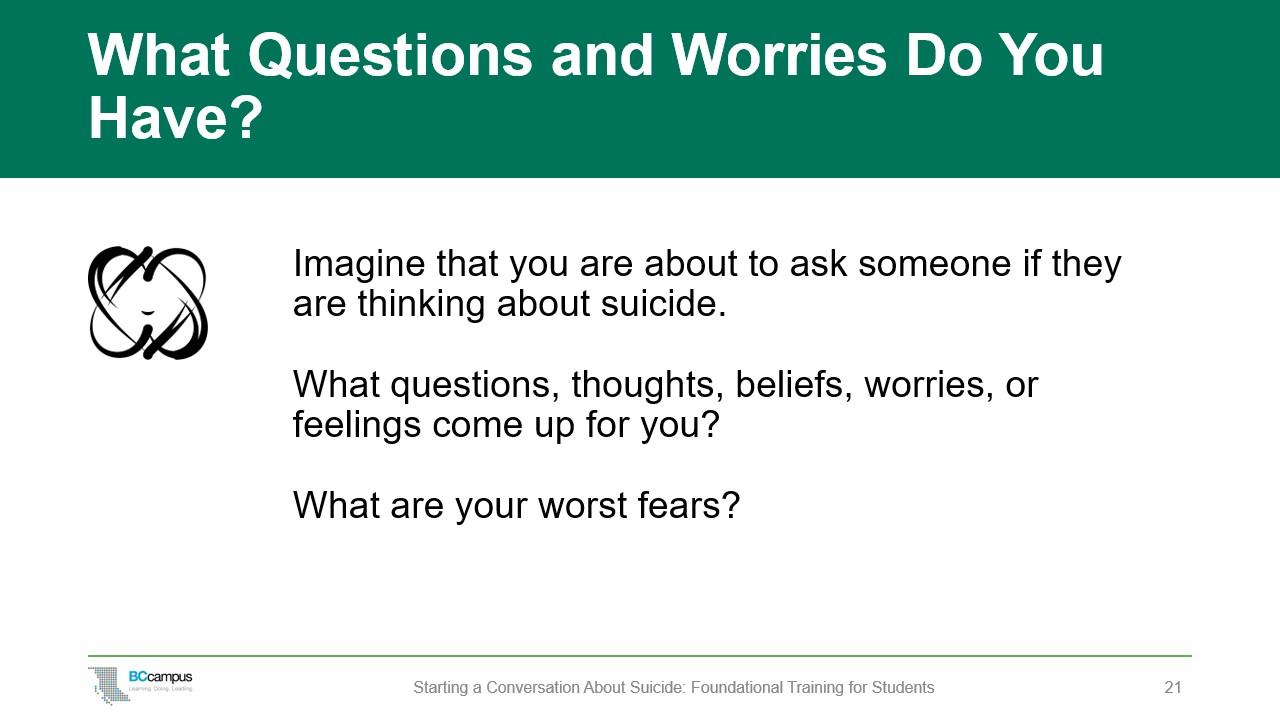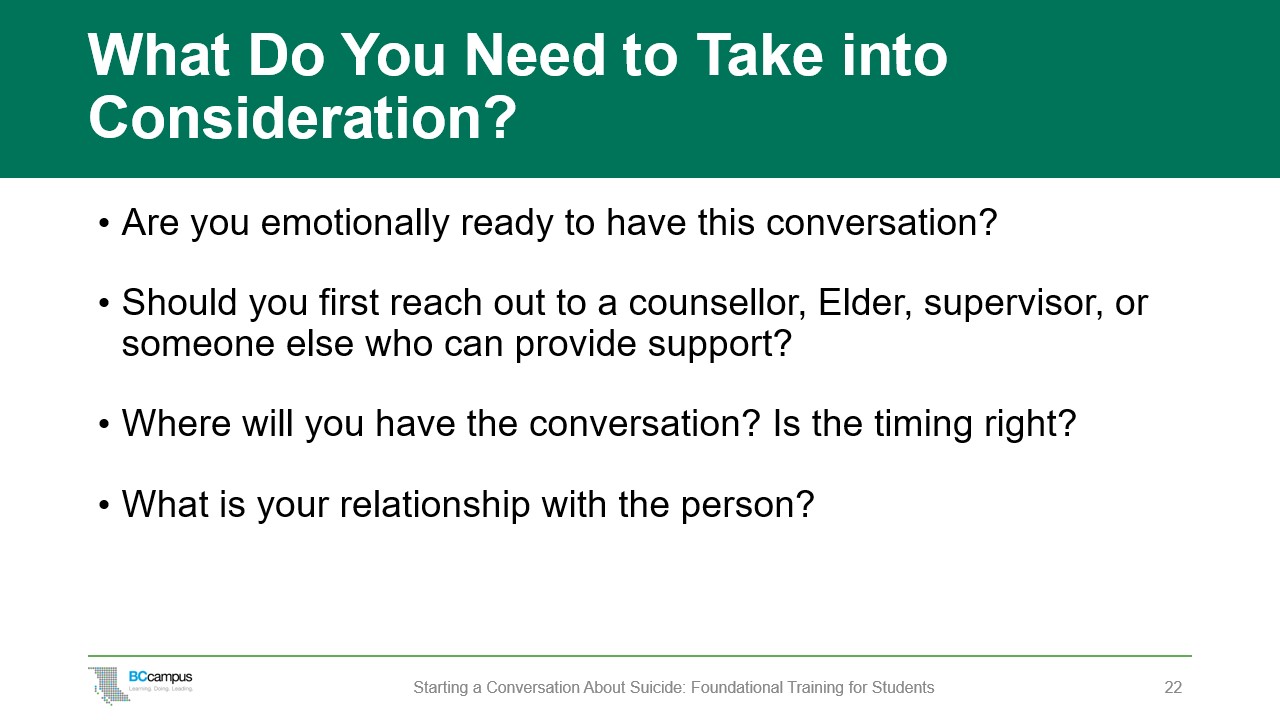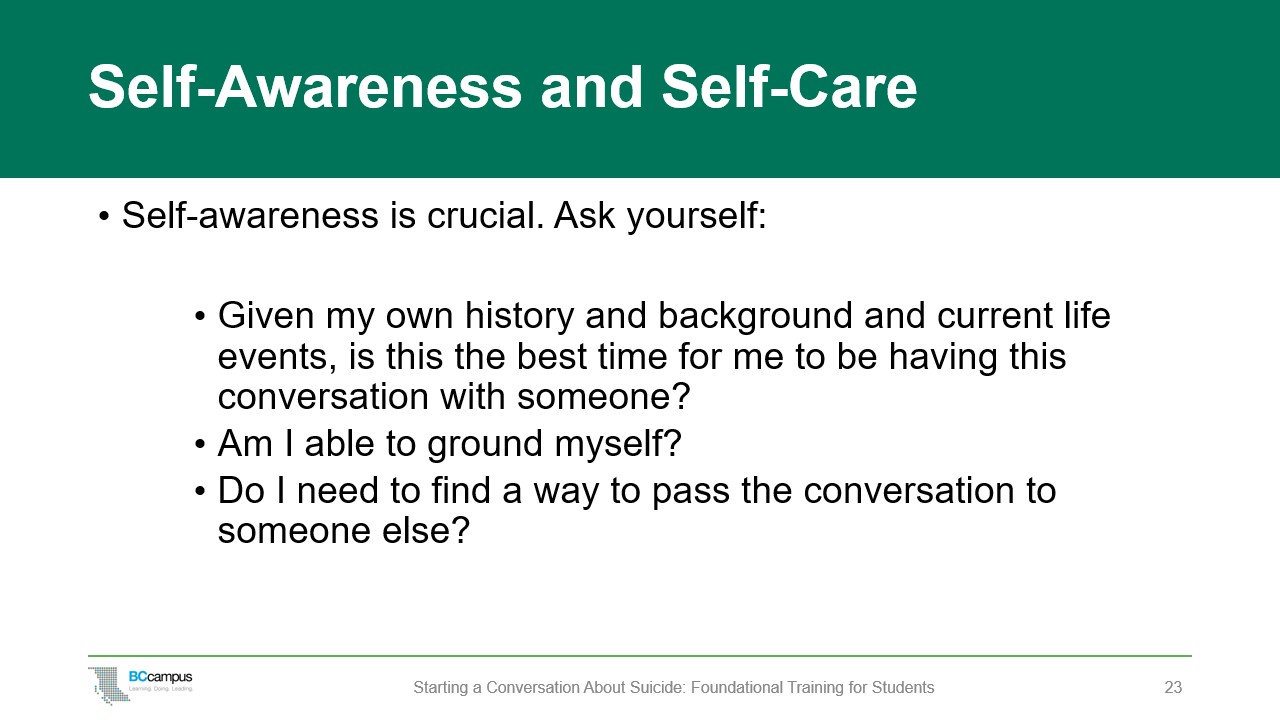Exploring Our Own Feelings About Suicide
These slides are available for use with this section of the presentation. For information about downloading presentation slides, see Introduction.
Feelings and Attitudes

Before we start to talk about how we can be in a support role for others, let’s take a moment to explore our own feelings and attitudes about suicide. It’s helpful to think about this ahead of time so that you don’t bump into surprising feelings or attitudes while trying to support someone; this way you can make sure the experience is more about them. You don’t have to do a complete assessment of yourself at this point, but this is an invitation to consider your own feelings and attitudes because you likely do have some beliefs and thoughts about this topic.
It’s okay to have different feelings and attitudes about suicide. Some of these beliefs will be more helpful than others. The goal is to let go of some of the less helpful ones to make sure that the interaction is about supporting someone else.
There are people who believe that suicide is wrong. We’re not here today to argue about the ethics or morality of it. We’re going to focus on questions, feelings, worries, and thoughts. Please be honest, but also remember that there may be people here who have personal experiences with suicide. Let’s make sure we treat each other with compassion and respect.
The thought of asking someone about suicide can be overwhelming. One concern that people often have is that if they bring up suicide and a person isn’t considering it, the person may start thinking about it as an option. That is untrue. Asking about suicide will not put the thought into someone’s mind. It can give the person a sense of relief (e.g., “Finally, someone has seen my pain”) or give them permission to open up further about something they have been hiding.

Activity: Questions and Worries
Ask participants to divide up into pairs to discuss these questions:
Imagine that you are able to ask someone if they are thinking about suicide. What questions, thoughts, beliefs, worries, feelings come up for you? What are your worst fears?
Then, as a large group, ask people to share their responses. (If the session is online, participants could share their responses in the chat.) Responses may include:
- I’d be afraid that my asking them would make them start thinking about it more.
- It’s so much responsibility.
- I don’t have time to deal with the issue fully.
- I won’t know what to do if they are considering suicide – what next?
- What if it’s insulting to my classmate/friend?
![]() Adaptations
Adaptations
You could also ask participants to think about their own beliefs and ideas about who does or does not end their own life. For example, a person may assume that seemingly in-control people are not at risk of suicide. Or perhaps they hold stereotypes or have ideas about specific groups of people and suicide. This is a good opportunity to explore any biases.
What We Need to Consider Before a Difficult Conversation

Before having a difficult conversation, there are a few things to ask yourself. If you know someone you think may be at risk of suicide, first think about your own emotions, thoughts, beliefs, and values. Ask yourself how you feel about starting this conversation with this person. You may realize you are not emotionally ready to talk to the person, and that is okay. You can reach out to other people on campus, such as a counsellor, Elder, or supervisor, to get their advice and support.

Before talking to someone about suicide, self-awareness is crucial. Ask yourself:
- Given my own history and background and current life events, is this the best time for me to have this conversation with someone?
- Am I able to ground myself?
- Do I need to find a way to pass the conversation to someone else (knowing that it’s okay to do so)?
You’ll also need to consider your relationship with the person. Are they a close friend or a roommate who you see every day? Or are they someone you know from class? You may have a more formal relationship with the person, or you may be in a role where you will be required to report serious concerns about a student to your supervisor (e.g., you’re a residence assistant or teaching assistant). How close you are to this person will affect how you start the conversation.
If you feel ready to have this sensitive conversation, think about how and where the conversation will happen:
- Create an atmosphere and environment of non-judgment and openness.
- Consider any possible triggers.
- Consider risk factors.
- Ensure that you are in a private space where you will not be interrupted and can minimize distractions (e.g., your phone is turned off).
- Be compassionate.
- Be patient.
- Be hopeful.
Media Attributions
- Person writing on white paper by NeONBRAND is licensed under a Unsplash License.
- Wooden path through forest by Michal Kulesza is licensed under CC0 Public Domain Dedication.
- reflections of heart by Álvaro Bueno is licensed under a CC BY 4.0 License.

